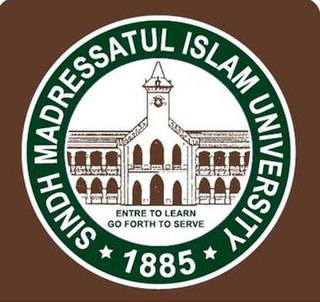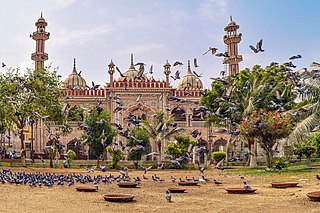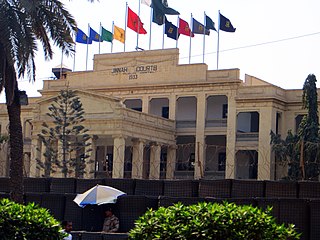
Karachi is the capital city of the Pakistani province of Sindh. It is the largest city in Pakistan and the 12th largest in the world, with a population of over 20 million. It is situated at the southern tip of the country along the Arabian Sea coast and formerly served as the capital of Pakistan. Ranked as a beta-global city, it is Pakistan's premier industrial and financial centre, with an estimated GDP of over $200 billion (PPP) as of 2021. Karachi is a metropolitan city and is considered Pakistan's most cosmopolitan city, and among the country's most linguistically, ethnically-, and religiously-diverse regions, as well as one of the country's most progressive and socially liberal cities.

Rawalpindi is the third-largest city in the Pakistani province of Punjab. It is a commercial and metropolitan city, being the fourth most populous in Pakistan. It is located near the Soan River in north-western Punjab, and is the third-largest Punjabi-speaking city in the world. Rawalpindi is situated adjacent to Pakistan's capital Islamabad, and the two are jointly known as the "twin cities" because of the social and economic links between them.

Sindh Madressatul Islam University is a university in Karachi, Sindh, Pakistan. Founded in 1885, it is one of the oldest educational institutions in South Asia.

Lyari is a historic locality in Karachi, Pakistan. It is the most densely-populated part of Karachi, and is one of its earliest settled areas.

The National Academy of Performing Arts is a performing arts school located at Hindu Gymkhana in Karachi, Sindh, Pakistan. NAPA was established in 2005 as an institution to conserve and teach performing arts and music.

Clifton is an upscale and historic seaside locality in Karachi, Pakistan. It is one of the most affluent parts of the city, home to some of Karachi's most expensive real estates. It is home to several foreign consulates, while its commercial centres are amongst the most high-end in Pakistan, with a strong presence of international brands.

Muhammad Ali Jinnah Road, frequently abbreviated as MA Jinnah Road, is a major thoroughfare in central Karachi, Pakistan. The road was originally named Bandar Road, because it linked the city to the Port of Karachi, but was later renamed in honour of Pakistan's founder, Muhammad Ali Jinnah. MA Jinnah Road stretches 6.1 kilometres from Jinnah Bridge in the south, near the Port of Karachi, to Gurumandir Chowk, north of Mazar-e-Quaid. It is one of the city's oldest roads, and passes through much of the colonial era historic core of Karachi, with numerous landmarks along its route.

Merewether Clock Tower or Merewether Tower is a neo-Gothic clocktower built during the Victorian era in Karachi, Pakistan. The tower is a landmark in central Karachi, and is at the termini of two of the most important roads in central Karachi: Muhammad Ali Jinnah Road and I. I. Chundrigar Road. The tower used to mark the boundary of the city when arriving from the port at Kiamari, and marked the dividing line between Karachi's Old Town and its newer European quarters to the east. It currently is the westernmost point of the Serai Quarter.

The Hindu Gymkhana is a colonial-era building located on Sarwar Shaheed Road in Karachi, Pakistan. It was the first public building in Karachi to adopt the Mughal-Revival architectural style. It was established in 1925 by the Karachi's Hindus as an exclusive club for their community. The building houses the National Academy of Performing Arts.

Dayaram Jethamal Sindh Government Science College, commonly known as DJ Science College, is a public community college that is affiliated with the Board of Intermediate Education Karachi and the University of Karachi — it is located near Burns Road in Karachi, Sindh, Pakistan.

Aram Bagh, better known as Ram Bagh is a neighborhood located in historic center of Karachi, Pakistan that was built around the Aram Bagh Park. Aram Bagh has a high concentration of listed and protected heritage buildings, with many in a good state of conservation.

Serai Quarter, sometimes called Serai Quarters, is a neighbourhood in central Karachi, Pakistan that according to Pakistan forms much of its historic central business district. In addition to Karachi's financial centre centred on Serai Quarter's I. I. Chundrigar Road, Serai Quarter contains over 200 "historic buildings", which make up about 37% of all building plots in the quarter. Of these, 78 are protected by the Sindh Cultural Heritage Preservation Act of 1994.

The Karachi Chamber of Commerce and Industry Building, also known as the KCCI Building, is a heritage building in central Karachi, Pakistan dating from 1934. Its foundation stone was laid by Gandhi in July 1934. It currently serves as headquarters for the Karachi Chamber of Commerce & Industry.

The Dawood Foundation (TDF) is a nonprofit family foundation based in Karachi, Pakistan. TDF has been working in Pakistan since the 1960s and has been heavily involved in establishing various formal and informal education institutions across the country.

The TDF Ghar is an informal learning space situated in Karachi, Pakistan. It’s a house constructed in the 1930s and restored as a living museum. The Dawood Foundation (TDF) has retained the heritage architectural features of the house to preserve the living style of the past residents of cosmopolitan Karachi.

Jinnah Courts, formerly known as Leslie Wilson Muslim Hostel, is a heritage building located on Dr Ziauddin Ahmed Road in Karachi's Civil Lines. Initially serving as a hostel for students from Sindh, the Pakistan Rangers temporarily moved in during 1999 and have remained there since.
Pakistan Chowk is a chowk and cultural heritage site in Saddar Town, Karachi.
Mitha Ram Hostel, also spelled as Mitharam Hostel, is a historical building and former hostel in Karachi. It now serves as a sub-jail under the administration of Sindh Rangers since April 2015.

















